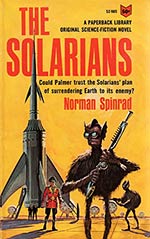
![]() BigEnk
BigEnk
5/15/2025
![]()
A short, adventurous, and mediocre space opera from Spinrad's early days. The plot, which takes up the large majority of the book, revolves around a centuries old war between humanity and the Duglarri, a calculating species of furry humanoids that value reason and logic above all else. The humans have been losing the war since the start due to a deficiency in numbers and an over reliance on computer analysis, but remain hopeful because of the humans that remain on Earth itself. They separated themselves during the onset of the war to work on a novel solution to war. Jay Palmer, a seasoned commander in the human confederation, witnesses the return of a group of the Solarians, and gets wrapped up in helping them enact their plan for victory.
If that sounds pretty basic and pulpy, it's because it is. It reads more as something from the golden ages of the pulp magazines than something published in 1966. This was Spinrad's first published work, so it makes sense that he would rely on the tried and true motifs of the genre, writing something that was similar in a lot of ways to the stuff he read when he was growing up. The plot itself is insanely predictable. I grew bored reading it, in spite of it's razor slim size, because you can see the way the plot is heading from the first 30 pages. I found myself just waiting around to see to what degree I was correct. The characters tend to be paper thin, serving mostly to emote about plot events and give lenghty soliloquies about Spinrad's cultural bugaboos. The obsession over why computers are bad feels extremely outdated.
Nevertheless there are some redeeming qualities here. While not the most novel story, Spinrad writes clearly and keeps a decent pace. He writes a good example of what would now be seen as a polyamorous relationship, something that he calls the 'organic group'. The relationship between the group of Solarians is surprisingly nuanced, especially for it's time. It doesn't feel like Spinrad writes it from a lecherous or gross perspective, which is an achievement for the time it was written. This was perhaps the one aspect that the book took from the new wave generation that surrounded it. I also enjoyed the concept of a psychotic dictator programming the mega-computer that runs an entire society to choose his successors based on how similar they are to him, ultimately turning everyone into carbon copies of himself. Just some weird schlocky fun.
Overall, pretty forgettable. While I enjoyed it enough to finish it, and there's nothing objectively awful about it, I can't see myself ever re-reading it. I really just don't have that much to say about it. It doesn't inspire a lot of critical thought or opinion.